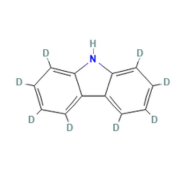
Carbazole D8
Molecular Weight: C12D8NMolecular Formula: 162.27 g/mol
CAS Number: 38537-24-5
Carbazole D8, also known as deuterated carbazole, is a captivating chemical compound that has garnered significant attention in scientific circles. With its unique isotopic labeling and versatile applications, Carbazole D8 has become an invaluable tool in various fields of study. Here, we aim to provide you with a deep dive into the world of Carbazole D8, shedding light on its properties, uses, and the latest cutting-edge research surrounding it. Join us on this scientific voyage as we unravel the mysteries and unlock the full potential of Carbazole D8 in the dynamic landscape of chemistry.
What are the uses of Carbazole D8 ?
Carbazole D8, a deuterated variant of carbazole with eight deuterium atoms, finds several important uses in scientific research and industrial applications. One of its primary uses is in fluorescence studies and photophysics. The presence of deuterium atoms in Carbazole D8 imparts unique spectroscopic properties, making it a valuable tool for investigating the photophysical behavior of fluorophores. Researchers use it to study fluorescence lifetimes, quantum yields, and other fluorescence-related parameters, helping to understand energy transfer processes and photoinduced phenomena.
Another significant application of Carbazole D8 is in the field of organic electronics and optoelectronics. Deuterium-labeled carbazole is employed in the synthesis of labeled organic semiconductors and materials. These labeled compounds are used to study charge transport, exciton dynamics, and other fundamental processes in organic electronic devices. The use of Carbazole D8 in these studies enables researchers to design and optimize organic materials for applications in organic light-emitting diodes (OLEDs), organic photovoltaics (OPVs), and other organic electronic devices.
Moreover, Carbazole D8 serves as a valuable isotopic label for tracing reactions in organic synthesis. The presence of deuterium atoms allows researchers to investigate reaction mechanisms, track the movement of atoms in molecules, and identify intermediates in complex chemical transformations. This contributes to a deeper understanding of organic reactions and facilitates the development of new synthetic strategies.
Synonyms
- Deuterated carbazole
- Carbazole D8
- Carbazole with deuterium (D8-)
- D8-labeled carbazole
- Perdeuteriocarbazole
Chemical Properties
- Molecular Formula: C12D8N
- Molecular Weight: 162.27 g/mol
- Boiling Point: Approximately 350-360°C (662-680°F)
- Melting Point: Approximately 238-240°C (460-464°F)
- Appearance: Off-white to light yellow solid
- Solubility: Insoluble in water, soluble in organic solvents
- Molecular Formula: C12D8N
- Molecular Weight: 162.27 g/mol
- Boiling Point: Approximately 350-360°C (662-680°F)
- Melting Point: Approximately 238-240°C (460-464°F)
- Appearance: Off-white to light yellow solid
- Solubility: Insoluble in water, soluble in organic solvents

